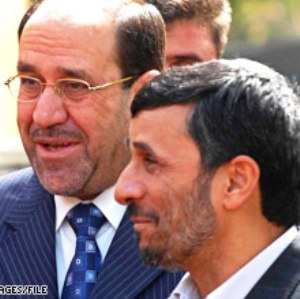Still Iran’s Favorite

Since the parliamentary elections of March 7th, negotiations between Iraqi parties to form the next cabinet have remained in the headlines. According to the latest news, Nuri Maliki -head of the Rule of Law alliance- has lost hope for a coalition with his Shia friends in the National Alliance (led by Ammar Hakim, Muqtada Sadr, and Ahmed Chalabi), and is searching for other alternatives. Reportedly, Maliki is now seeking a partnership with Ayad Allawi -leader of the al-Iraqiyah bloc- and has called for Washington’s mediation to convince Allawi to trade the coveted premiership for the presidential post. The Kurds would be chairing the parliament under Maliki’s proposed plan.
To discuss the details of the plan, U.S. Vice President Joseph Biden will soon be visiting Iraq. Washington has already approved the draft, while it has suggested an extension of presidential powers using the flexibility of Iraq’s Constitution. Needless to say, the plan has raised fears of marginalization inside the National Alliance.
Where does Iran stand in this deal? Some members of the National Alliance do not hide their frustration with Iran’s silence -which they interpret as tacit support for Maliki (and his plan). Iran, however, has proven that the continued rule of a Shia government is the mainstay of its Iraq policy, regardless of who that figure may be. A combination of pragmatism and Shiism make Allawi, Maliki, and Hakim essentially the same to Iran. Yet Nuri Maliki is not a dead horse for Iran, not as long as he has not tried to undermine the interests of Shias or of Iran. Maliki is still the most powerful politician in Iraq and his Rule of Law alliance lost the election to Ayad Allawi with only a two-seat margin. While it is true that Maliki has questioned the 1975 Algiers Accord (between Iran and Iraq, which aimed to settle disputes over the Shatt al-Arab/Arvand Rud), stirred up controversy over the disputed Fakkah Oil Field and refused to annul the visa regime; nonetheless for the Iranian leadership, he is still controllable. In the meantime, Maliki is still a popular figure inside Iraq, despite protests such as the recent demonstrations in the southern city of Basra over an electricity shortage. In Iraq, these days the chants of “Abu Asra’ is a hero” are heard often enough (Abu Asra’ is Maliki’s title, refereeing to his daughter’s name).

